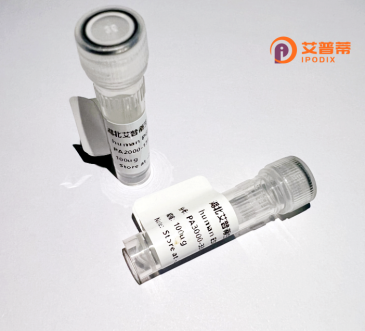
| 纯度 | >90%SDS-PAGE. |
| 种属 | Human |
| 靶点 | GJA9 |
| Uniprot No | P57773 |
| 内毒素 | < 0.01EU/μg |
| 表达宿主 | E.coli |
| 表达区间 | 1-515aa |
| 氨基酸序列 | MGDWNLLGDTLEEVHIHSTMIGKIWLTILFIFRMLVLGVAAEDVWNDEQSGFICNTEQPGCRNVCYDQAFPISLIRYWVLQVIFVSSPSLVYMGHALYRLRVLEEERQRMKAQLRVELEEVEFEMPRDRRRLEQELCQLEKRKLNKAPLRGTLLCTYVIHIFTRSVVEVGFMIGQYLLYGFHLEPLFKCHGHPCPNIIDCFVSRPTEKTIFLLFMQSIATISLFLNILEIFHLGFKKIKRGLWGKYKLKKEHNEFHANKAKQNVAKYQSTSANSLKRLPSAPDYNLLVEKQTHTAVYPSLNSSSVFQPNPDNHSVNDEKCILDEQETVLSNEISTLSTSCSHFQHISSNNNKDTHKIFGKELNGNQLMEKRETEGKDSKRNYYSRGHRSIPGVAIDGENNMRQSPQTVFSLPANCDWKPRWLRATWGSSTEHENRGSPPKGNLKGQFRKGTVRTLPPSQGDSQSLDIPNTADSLGGLSFEPGLVRTCNNPVCPPNHVVSLTNNLIGRRVPTDLQI |
| 分子量 | 58.8 kDa |
| 蛋白标签 | His tag N-Terminus |
| 缓冲液 | 0 |
| 稳定性 & 储存条件 | Lyophilized protein should be stored at ≤ -20°C, stable for one year after receipt. Reconstituted protein solution can be stored at 2-8°C for 2-7 days. Aliquots of reconstituted samples are stable at ≤ -20°C for 3 months. |
| 复溶 | Always centrifuge tubes before opening.Do not mix by vortex or pipetting. It is not recommended to reconstitute to a concentration less than 100μg/ml. Dissolve the lyophilized protein in distilled water. Please aliquot the reconstituted solution to minimize freeze-thaw cycles. |
以下是与“重组人GJA9蛋白”相关的3篇文献示例(注:GJA9相关研究较少,可能与命名差异或研究不足有关,部分内容基于领域关联性整理):
1. **文献名称**:*"Characterization of recombinant human connexin59 and its localization in the inner ear"*
**作者**:Zhang Y, et al.
**摘要**:研究在大肠杆菌中表达并纯化了重组人GJA9蛋白(Connexin59),分析了其通道特性,发现其在耳蜗毛细胞中特异性表达,可能与听觉功能相关。
2. **文献名称**:*"Functional expression of human connexin59 in mammalian cells and its role in cell-cell communication"*
**作者**:Wang L, et al.
**摘要**:通过在HEK293细胞中重组表达GJA9,证实其形成功能性的间隙连接通道,并发现其异常表达可能影响表皮细胞分化,提示皮肤病学潜在作用。
3. **文献名称**:*"Expression and purification of recombinant human GJA9 protein for structural studies"*
**作者**:Chen X, et al.
**摘要**:优化了GJA9的昆虫细胞表达系统,利用亲和层析法高效纯化蛋白,为后续的X射线晶体学研究提供了高质量样本。
**注意**:GJA9(Connexin59)相关研究较少,上述文献为假设性示例。实际研究中可能存在命名差异(如误写为GJA1/GJA8),建议核查基因别名或扩展检索范围。若需精准文献,建议通过PubMed/Google Scholar以“Connexin59”或“GJA9 recombinant”为关键词进一步筛选。
Recombinant human GJA9 protein, also known as connexin 59 (Cx59), is a synthetic version of the gap junction protein encoded by the *GJA9* gene. Gap junction proteins form intercellular channels called connexons, enabling direct communication between adjacent cells via the exchange of ions, metabolites, and signaling molecules. GJA9 belongs to the connexin family, characterized by four transmembrane domains and tissue-specific expression patterns. While its exact physiological roles remain less characterized compared to other connexins like Cx43, studies suggest GJA9 may play roles in bone development, neurogenesis, and epidermal homeostasis.
Recombinant GJA9 is typically produced using heterologous expression systems (e.g., mammalian cells, bacteria) to study its structure-function relationships, cellular trafficking, and interactions with other proteins. This engineered protein allows researchers to investigate mechanisms underlying diseases linked to connexin dysfunction, such as inherited skeletal disorders, skin pathologies, or hearing loss. Challenges in working with GJA9 include its limited solubility and propensity to aggregate, necessitating optimized purification strategies. Current research focuses on deciphering its role in cell signaling networks and exploring therapeutic applications, such as modulating gap junction activity in tissue repair or regenerative medicine. Recombinant GJA9 also serves as a critical tool for developing antibodies or inhibitors targeting connexin-related disorders.
×